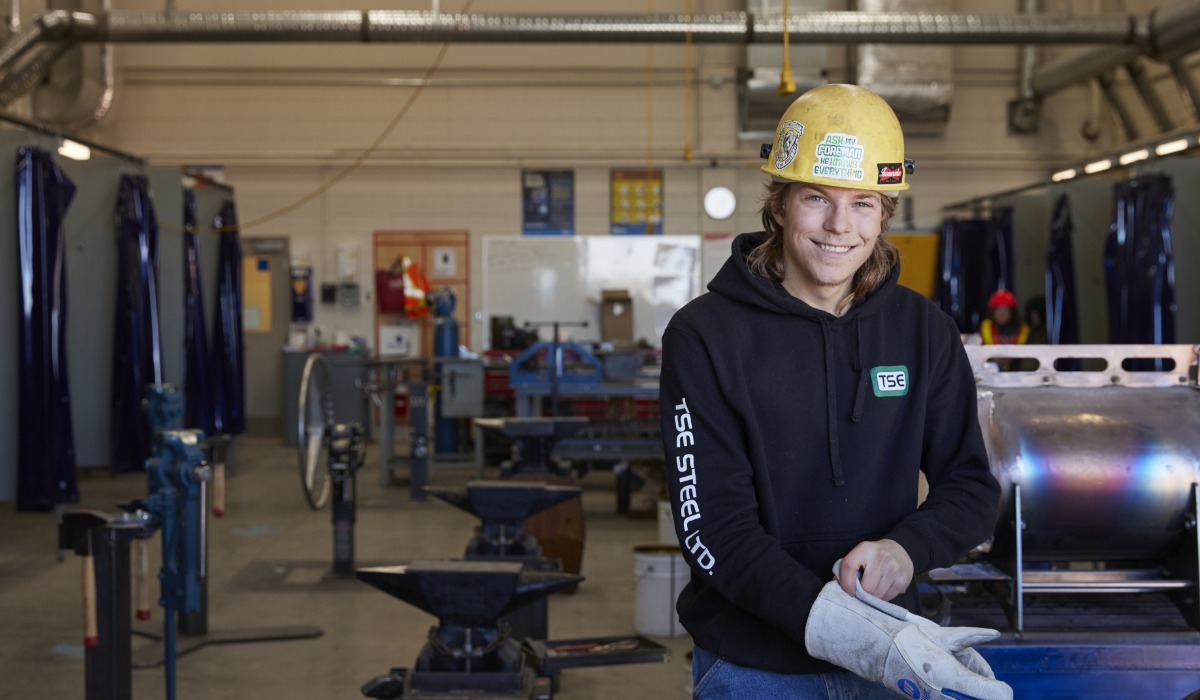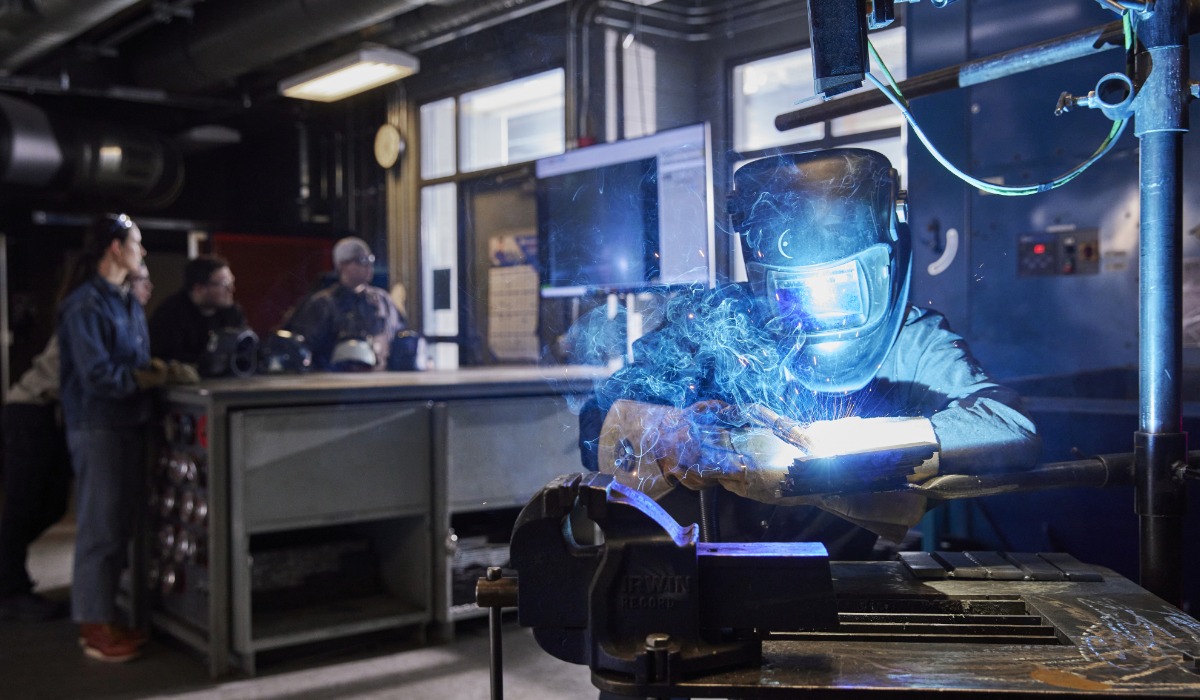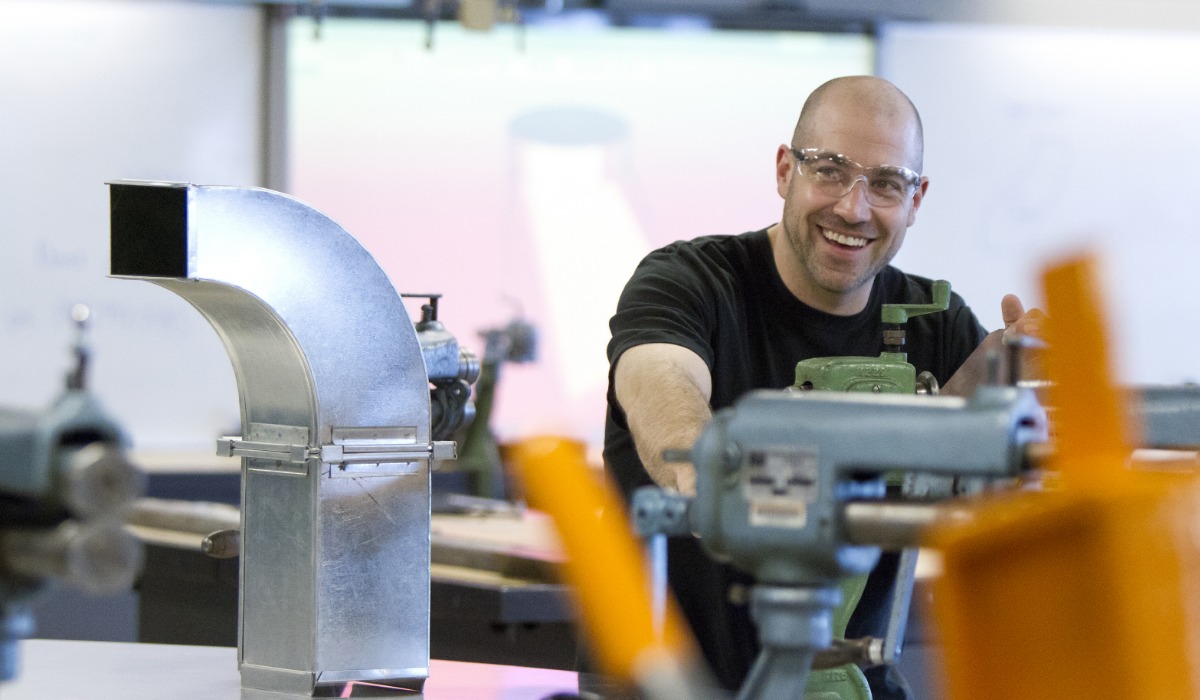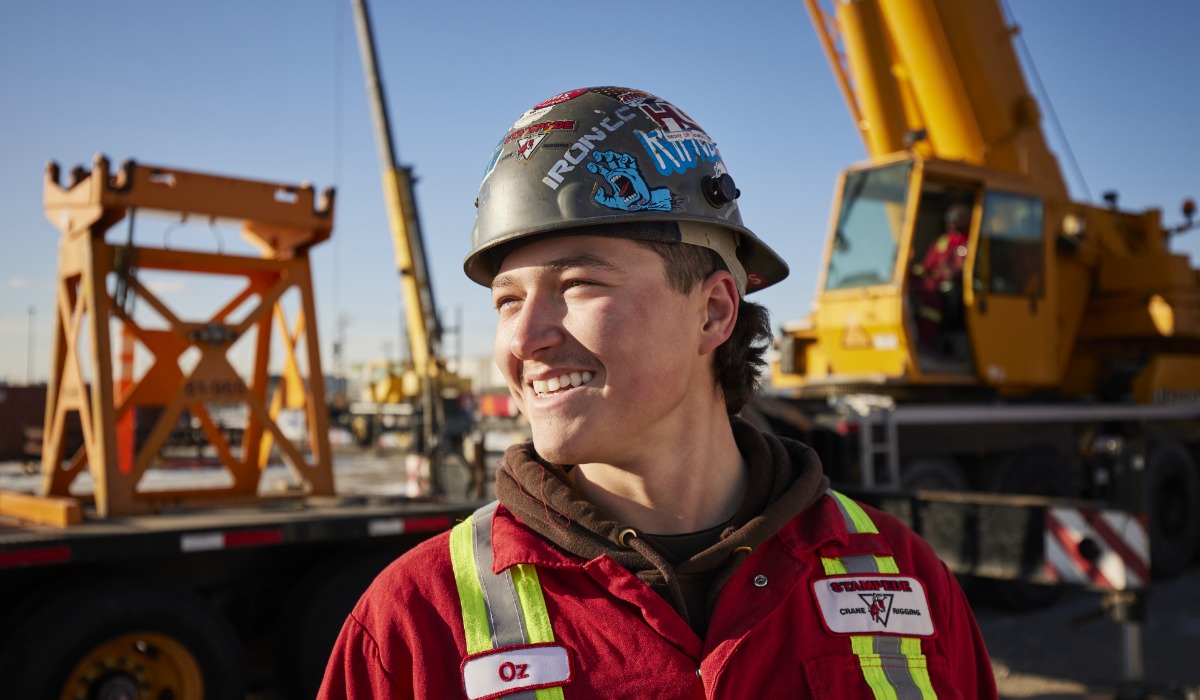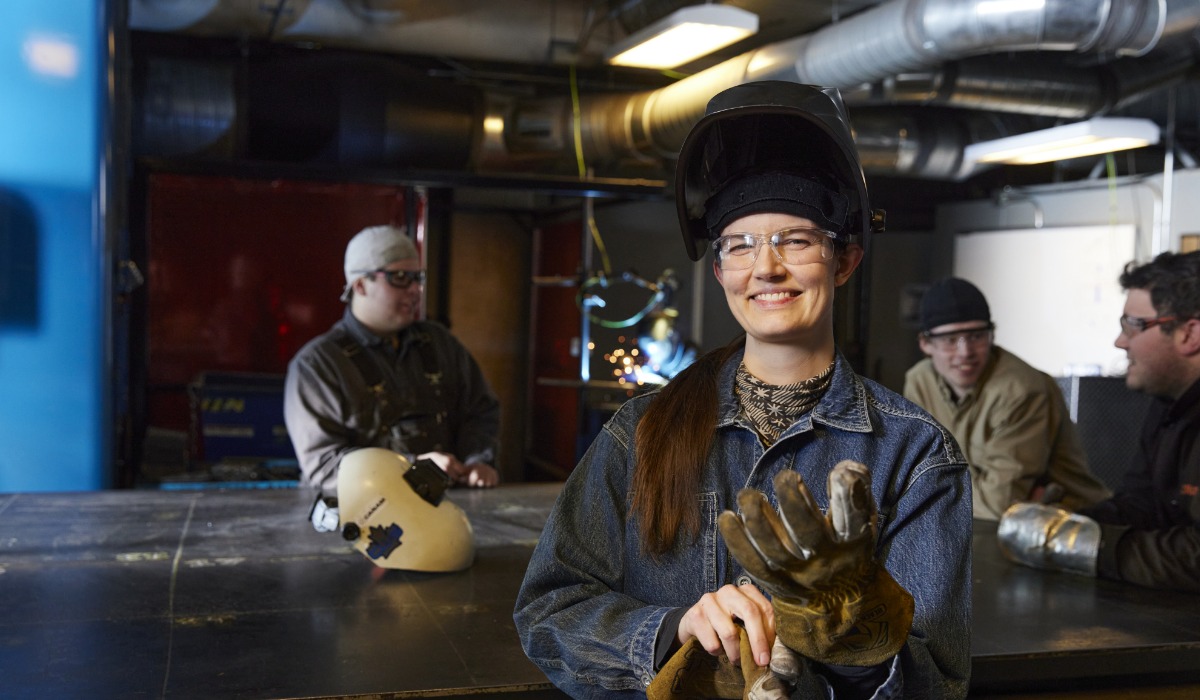Overview
Learn to fabricate, construct and join scaffolding, structural steel buildings, bridges, ornamental ironwork and pre-cast structures.
Ironworkers build structural components, reinforce steel, post-tension tendons, install conveyors and robotic equipment and sometimes perform reconstructive work on existing structures.
While on the job, you'll perform some of the following duties:
- read blueprints
- arrange steel pieces so they can be lifted as needed
- set up scaffolding, construction cranes, derricks and other equipment
- assemble rigging to move heavy equipment and materials
- direct crane operators with hand signals or radios
- position steel units, align holes and insert temporary bolts
- check alignments and join steel parts together by bolting or tack welding
- put together prefabricated metal structures
- cut, bend and secure steel bars or wire mesh to reinforce concrete
- install structural metalwork such as metal stairways and railings
- unload and install pre-cast components.
Ironworkers are motivated, are comfortable working at heights and enjoy a variety of tasks. If you like physically active work and working on a team, you’ll excel in this line of work.
To succeed in this trade, you should:
- have stamina and physical strength
- have good coordination, agility and balance
- enjoy working outdoors in a wide variety of locations
- enjoy working cooperatively with other people
- act quickly and decisively
- be committed to safe work habits.
Upon successfully completing the required working hours and technical training periods, you'll be awarded a certificate in addition to journeyperson status by Alberta’s Apprenticeship and Industry Training.
Ironworker — reinforcer and Ironworker — structural/ornamental are Red Seal Endorsed trades — a recognizable standard that allows tradespeople to work across Canada.
As an ironworker, you'll be able to specialize in three different areas:
- Metal building systems erector (2 periods): you'll fabricate, construct and join scaffolding. You're limited to working on two-story, steel-framed metal buildings. You’ll erect pre-engineered buildings and sometimes perform reconstructive work on existing structures.
- Reinforcing (2 periods): you'll place and tie reinforcing material, join scaffolding and stack steel units so each piece can be lifted as needed. You'll select, cut, bend, position and secure steel bars or wire mesh in concrete forms to reinforce concrete. You may also perform post-tensioning on structures requiring cable support, such as bridges.
- Structural/ornamental (3 periods): you’ll fabricate, construct and join scaffolding, structural steel buildings, bridges, ornamental ironwork and pre-cast structures. You’ll erect structural steel components and install conveyors and robotic equipment. You may also perform reconstructive and demolition work on existing structures.
*Ironworker - Metal Building System Erector is not a Red Seal Endorsed trade
Careers and opportunities
Our graduates may work in the following occupations. Some careers require additional experience and education.
Associated National Occupational Classification (NOC) codes: 72010, 72102, 72104, 72105, 72106, 92023, 94105, 95101.
Apprenticeship training
Depending on the specialty, apprenticeship education and on-the-job training will be different.
The term of apprenticeship for an Ironworker (Metal Building Systems Erector) is two years (two 12-month periods) including a minimum of 1620 hours of on-the-job training and six weeks of classroom instruction each period.
Year 1 | Period 1
You'll learn about standard workplace safety, mathematics, equipment uses and maintenance, drawing and load chart interpretation and rigging equipment for hoisting, lifting and load-moving operations. You'll also learn about using oxy-fuel equipment to heat and straighten metals.
Training length: 6 weeks
Year 2 | Period 3
You'll then learn about standard workplace safety, mathematics, equipment uses and maintenance, drawing and load chart interpretation and rigging equipment for hoisting, lifting, and load-moving operations. You'll also learn welding processes and how to service, maintain and repair metal building systems and ornamental metalwork.
Training length: 6 weeks
The term of apprenticeship for an Ironworker (Reinforcing) tradesperson is two years (two 12-month periods) including a minimum of 1620 hours of on-the-job training and six weeks of classroom instruction each period.
Year 1 | Period 1
You'll learn about standard workplace safety, mathematics, equipment uses and maintenance, drawing and load chart interpretation and rigging equipment for hoisting, lifting and load-moving operations. You'll also learn about using oxy-fuel equipment to heat and straighten metals.
Training length: 6 weeks
Year 2 | Period 2
You'll continue to learn about standard workplace safety, mathematics, equipment uses and maintenance, drawing and load chart interpretation and rigging equipment for hoisting, lifting, and load-moving operations. You’ll also learn about placing and tying concrete and specialized concrete reinforcement.
Training length: 6 weeks
The term of apprenticeship for an Ironworker (Structural/Ornamental) tradesperson is three years (three 12-month periods) including a minimum of 1620 hours of on-the-job training and six weeks of apprenticeship education each period.
Year 1 | Period 1
You'll learn about standard workplace safety, mathematics, equipment uses and maintenance, drawing and load chart interpretation and rigging equipment for hoisting, lifting and load-moving operations. You'll also learn about using oxy-fuel equipment to heat and straighten metals.
Training length: 6 weeks
Year 2 | Period 3
You'll continue to learn about standard workplace safety, mathematics, equipment uses and maintenance, drawing and load chart interpretation and rigging equipment for hoisting, lifting and load-moving operations. You'll also learn welding processes, how to install insulation, cladding and metal building accessories and how to service, maintain and repair metal building systems and ornamental metalwork.
Training length: 6 weeks
Year 3 | Period 4
You'll continue to learn about standard workplace safety, mathematics, equipment uses and maintenance, drawing and load chart interpretation and rigging equipment for hoisting, lifting and load-moving operations. You’ll also learn about welding processes, structural, ornamental and miscellaneous fabrication, pre-cast and curtain walls and pre-stressed concrete structures.
Training length: 6 weeks
Apprenticeship education performance
You must pass each section of the course and the AIT exam to succeed in apprenticeship education.
The passing grade for each period is no less than 50% in each course, with no less than a 65% average overall. A passing mark on each provincial exam and the interprovincial qualification (Red Seal Exam) is 70%.
View Alberta's Apprenticeship and Industry Training procedures
Training pathways
You can earn your journeyperson designation in the following way.
The traditional training pathway begins with finding a job with an employer willing to indenture you as an apprentice. Once you are an apprentice, you'll alternate between on-the-job training and educational periods.
You must apply for an apprenticeship through Alberta Apprenticeship and Industry Training before attending your first education period at SAIT.
Admission requirements
To enter an apprenticeship, you must have the educational qualifications required or recommended education for the trade to which you apply.
Entrance requirements are monitored and set by Alberta Apprenticeship and Industry Training.
Minimum requirements
Successful completion of the following courses:
- English 10-2
- Math 10-3
OR
A pass mark in all five Canadian General Educational Development (GED) tests
OR
Alberta Apprenticeship and Industry Training Entrance Exam
Recommended requirements
Apprentices with an Alberta High School Diploma that includes the following courses:
- English 30-2
- Math 30-3
- Physics 20 OR Chemistry 20 OR Science 20
- Related career and technology studies (CTS) courses
MyTradeSecrets
Once you have begun working as an apprentice, you can attend SAIT to complete your technical training.
You'll register for technical training at SAIT on MyTradeSecrets or you can register by phone.
Transfer agreements
At SAIT, we have created transfer agreements with partner institutions to allow you to earn course credits toward your SAIT program based on your previously completed credentials.
Transfer Alberta search tool
Use the Transfer Alberta search tool to see all transfer agreements between Alberta post-secondary institutions (including those with the University of Calgary, Mount Royal University and Bow Valley College.)
Search transfer agreements in Alberta
Transfer options for graduates
When you have completed this program, you may continue your education at a partner post-secondary institution. These transfer agreements include partnerships within and/or outside of Canada.
Credits this program transfers to
- Available credits:
- 42
- Available credits:
- 27
- Available credits:
- 30
- Available credits:
- 45
Available intakes
Costs
2025/26 tuition and fees
The following costs are effective as of July 1, 2025.
Metal Building Systems Erector and Reinforcing specialties
Structural/Ornamental speciality
This is a bring-your-own-device program with standard computer hardware and software requirements. See the specific requirements on our computers and laptops page.
Costs for books or modules, along with other items for classes, are:
- Period 1 (Common to all pathways): $200
- Period 2 (Reinforcing): $120
- Period 2 (MBSE and Structural): $160
- Period 3 (Structural): $160
Learning resources will be purchased on the first day of class at our Point Trotter campus.
This program requires personal protective equipment (PPE), which may be an added cost.
Funding options for apprentices
Apprentices get to learn while they earn, but there are still costs to consider. Many resources are available at SAIT and federally to help support apprentices.
Information sessions
Prepare for a strong start in your chosen program or get the details you need to decide your future path.
Our expert staff and faculty are ready to answer your questions and provide information about the following:
- What sets SAIT apart
- An introduction to the program and area of study
- Admission requirements
- Future career paths
- Information on the earning potential and graduate employment rates.
Contact
Have more questions?
Technical training at SAIT
School of Manufacturing and Automation
-
Phone - 403.284.8641
-
Email - ma.info@sait.ca
Apprenticeship training and registration
Apprenticeship and Industry Training Client Services

Oki, Âba wathtech, Danit'ada, Tawnshi, Hello.
SAIT is located on the traditional territories of the Niitsitapi (Blackfoot) and the people of Treaty 7 which includes the Siksika, the Piikani, the Kainai, the Tsuut’ina and the Îyârhe Nakoda of Bearspaw, Chiniki and Goodstoney.
We are situated in an area the Blackfoot tribes traditionally called Moh’kinsstis, where the Bow River meets the Elbow River. We now call it the city of Calgary, which is also home to the Métis Nation of Alberta.
